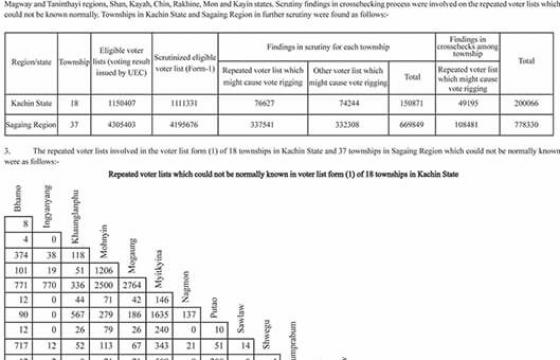After the Kachin Independence Organization (KIO) resignation, followed by the Wa National Organization (WNO), the hitherto United Nationalities Federal Council (UNFC) members of seven has been left with just five members. And of the remaining five, one of them – the Shan State Progress Party (SSPP) – has also joined the Pangkham alliance, also known as Federal Political Negotiation Consultative Committee (FPNCC), together with the KIO and thus the UNFC couldn’t be sure, if the remaining members count would be four or five. But at least for now, it could be counted as five, because the SSPP has not resigned from the UNFC, although at the same time, it is also the Pangkham alliance member.
UNFC members are KIO; SSPP; New Mon State Party (NMSP); the Karenni National Progressive Party (KNPP); the WNO; the Lahu Democratic Union (LDU); and the Arakan National Council (ANC)
If one now leaves aside the Arakan National Council (ANC) and Lahu Democratic Union (LDU), the two organizations within the UNFC, as both hardly have any fighting force, only the KNPP and the NMSP would be left as important and countable forces that have round about between 600 to 1000 troopers each.
While the said two Ethnic Armed Organizations (EAOs) have fighting forces not comparable to some of the big EAOs, with some ranging from 8000 to 30,000, their political correctness and prowess are rare, seen from the steadfast struggle for ethnic rights of self-determination point of view.
For example, when the two biggest EAOs, the KIO and SSPP joined the FPNCC, rumors were making the rounds that the left over UNFC members would sign the Nationwide Ceasefire Agreement (NCA), as they were thought to be in panic and not wanting to be left hanging in the limbo, on which even the State Counselor Aung San Suu Kyi made a premature, unverified statement, thanking them on how their decision to sign would help strengthen the peace process, that actually failed to materialize.
In the end, seeing that the remaining four UNFC members, especially the KNPP and NMSP, insisted that its nine-point proposal to amend the NCA had to be first settled before they could sign it, the government’s Peace Commission (PC) came up with a Deeds of Commitment (DoC) proposal that they inked this as a stopgap agreement first and later sign the actual NCA. And in return, the government would let them participate in the Union Peace Conference – 21st Century Panglong (UPC-21CP), with rights to discuss and table position papers, but could not only make decision.
According to the NCA rule, only fully fledged members that signed the NCA could vote within the Union Peace Dialogue Joint Committee (UPDJC), the main setup responsible for holding the UPC-21CP.
The remaining four UNFC members rejected the PC’s proposal and were invited as “special guests”, which they also turned it down.
Now with the said new EAOs’ configuration, the question arises how the future of the NMSP and the KNPP would look like.
Militarily, if the KNPP and NMSP would stay out of the NCA signing, it is possible that the Tatmadaw or the Military might likely put the pressure on them.
While militarily the NMSP could be hard pressed, given that it is surrounded by the NCA signatory Karen National Union (KNU) and government’s Border Guard Forces (BGF), with not much space to maneuver, the KNPP would be able to survive even if militarily pressured, as it has always done in the past.
Politically, General N’Ban La met Suu Kyi when he was in Nay Pyi Taw last month together with the Pangkham alliance, made necessary by Chinese intervention on Burma’s government and Tatmadaw.
According to an insider source closed to a signatory EAO, during the invited lunch of General N’Ban La and his wife separately, Suu Kyi was said to have asked, whether he would like to stay with the UNFC or Pangkham alliance, to which he answered that he wanted to be with the UNFC, if its nine-point proposal could be agreed upon.
The rumor had it that Suu Kyi was said to have answered that of the nine-point proposal only the two parts that mentioned the involvement of international players in Ceasefire Joint Monitoring Committee (JMC) and neutral NCA enforcement, mediation team – should there be dispute among stakeholders – were exception, which could not be agreed upon.
UNFC’s nine-point proposal includes: nationwide ceasefire declaration within 24 hours, followed by the UNFC troops doing likewise within 48 hours; formation of an equal, genuine federal union based on Panglong spirit; tripartite dialogue composition – government, Military, parliament; EAOs; and political parties – in all levels of the peace process; drawing up a constitution according to the outcome of 21st Century Panglong Conference; allowing international parties’ participation to be able to jointly monitor and enforce ceasefire agreement; and concerning big scale development plans to adhere to the Extractive Industries Transparency Initiative (EITI), in cooperation with the concerned public and the EAOs.
If this would become a reality, provided the compromise could be found with the blessing of the Tatmadaw, the political fortune of the KNPP and NMSP could changed, as the KIO and SSPP would also sign the NCA under the banner of UNFC. Otherwise, their immediate future would likely be the same as it is now, with the pending of NCA signing and continuous on and off negotiation mode with the PC on its nine-point proposal.
The longer perspective would be to either make a compromise with the PC on its demand, provided there would be a real give-and-take atmosphere, or if the PC side doesn’t give in to any demand and just want them to sign the NCA without alteration, the likely outcome would be the total rejection of the KNPP and NMSP to sign it and risk possible military pressure from the Tatmadaw.
But for now and by the look of it, the Military is unlikely to militarily pressure the two EAOs, as it is preoccupied with the ongoing wars in Kachin and Shan States and this would only work to the advantage and credit of Suu Kyi’s regime, which it is not so keen to see it happen. Besides, the Tatmadaw is said to have enough headache with the non-secession clause that the ethnic protested vigorously during the UPC-21CP and like to keep the EAOs’ participation count limited as it is now.
In sum, the immediate future of the KNPP and NMSP would not change much and would likely continue in the same status quo mode for the time being.






